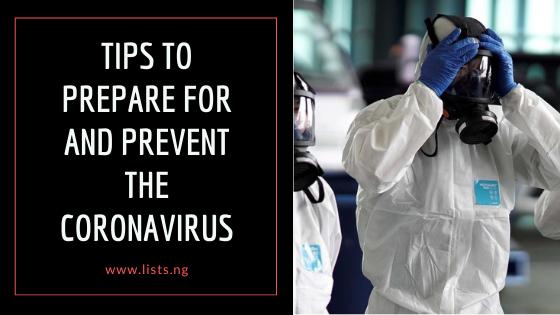It was announced yesterday February 27 2020 that the first case of the COVID-19 in Sub-Saharan Africa has been recorded in Lagos Nigeria. The deadly virus was discovered in an Italian citizen who returned to Nigeria from Milan on February 25 2020. According to the Federal Ministry of Health, the patient is in stable condition and is being managed at the Infectious Disease Hospital, Yaba.
As the Federal Ministry of Health continue to put in place measures to contain the virus, below is a list of tips to help you prepare and prevent the deadly coronavirus.
How deadly is the virus
Compared to prior outbreaks of novel viruses, this coronavirus appears less deadly. The death rate for MERS was about 34% and SARS was about 10% while the overall, the death rate of the COVID-19 in China is estimated at 2 percent. Those who stand the greater risks of contacting the virus are people in their 70’s and those with underlying medical problems, and particularly smokers. For now, vaccine has not been created for the virus, but flu prevention strategies could be applied to protect against coronavirus.
Hygiene
It is important to maintain good personal and household hygiene at this moment. Washing of hands regularly with soap and clean water is very vital. Avoid touching your eyes, nose and mouth, cover your cough or sneeze with a tissue and throw the tissue away, clean and disinfect frequently touched surfaces and objects. Further more face masks are also very important to cover your nose and prevent contacting the virus trough the air.
Don’t panic, just prepare
You don’t have to panic buy and fill your home with unnecessary provisions. However, it is advisable to restock on food supplies a little bit more than usual just to be prepared. More so, for general emergency preparedness, every home should have an emergency response kit such as nonprescription drugs, pain relievers, stomach remedies, cough and cold medicines, fluids with electrolytes, and vitamins.
Avoid crowded places
Avoid going to crowded places such as the markets, bars, religious gatherings etc. Generally be mindful of making close contact with people, especially those with symptoms.
Get tested
Do not jump into conclusions and more importantly, do not take chances. The best way to first determine whether you have the virus is to get tested. If you develop a fever, cough, runny nose, sore throat and shortness of breath within 14 days after having close contact with someone who has traveled and is showing symptoms, you should call ahead to a doctor. Further more, if you suspect you are sick with the virus, wear a facemask — and cover your coughs and sneezes, clean your hands often and avoid sharing personal household items with others, such as utensils, dishes or bedding.



